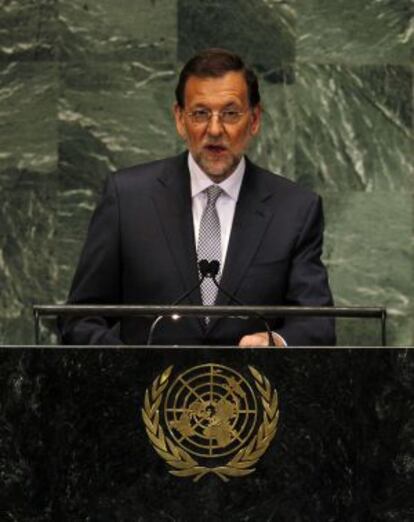Rajoy will seek second bailout if borrowing costs soar once more
Risk premium moves back above 450 basis points Government to create agency to police compliance with budget goals


Spain’s risk premium headed north again on Wednesday, a development Prime Minister Mariano Rajoy acknowledged could led him to ask for a second bailout from the Europe if the situation persists.
Asked in an interview in New York with The Wall Street Journal published on Wednesday if he planned to ask one of the two European rescue funds for help, Rajoy said his government would need to ascertain first if the conditions attached to a bailout are “reasonable.” However, he added that if interest rates in Spain are “too high for too long,” thus depressing the economy even further and causing public debt to burgeon, “I can assure you 100 percent that I would ask for a bailout.”
In late trading, the yield on the Spanish benchmark government bond had moved back above six percent as the spread with the German equivalent stood at 458 basis points, up 35 from Tuesday’s close.
Market observers said the heightened tension in part reflected northern euro-zone countries opposition to the rapid implementation of a system whereby rescue funds can directly capitalize banks, as Rajoy wants, and German Chancellor Angela Merkel’s comments on Tuesday in which she urged caution in the creation of a pan-European bank supervisor.
In his interview with The Wall Street Journal, Rajoy also said his government would set up an independent agency to ensure compliance with the budget targets of all public administrations across Spain’s regions. This initiative will accompany the draft state budget for next year.
Rajoy also said his administration would introduce measures to restrict recourse to early retirement. Spain is gradually raising the retirement age from 65 to 67, a move the prime minister described as “reasonable.”
Gibraltar plea
Rajoy is currently in New York to push his country's candidacy for non-permanent status in the United Nations Security Council for the period 2015-2016. His trip kicks off a two-year diplomatic campaign through to October 2014, when the UN's 193 members are due to vote on the composition of the Security Council's non-permanent members.
Spain's main rivals for the western seat in the Council include New Zealand, which has the support of smaller countries that make up more than half of the assembly, and Turkey, which is emerging as a diplomatic force in the Arab world and central Asia.
In his maiden speech before the General Assembly on Tuesday night, Rajoy urged Britain to rejoin bilateral talks on Gibraltar, saying “two much time has been lost” since those negotiations were broken off in 2002.
Tu suscripción se está usando en otro dispositivo
¿Quieres añadir otro usuario a tu suscripción?
Si continúas leyendo en este dispositivo, no se podrá leer en el otro.
FlechaTu suscripción se está usando en otro dispositivo y solo puedes acceder a EL PAÍS desde un dispositivo a la vez.
Si quieres compartir tu cuenta, cambia tu suscripción a la modalidad Premium, así podrás añadir otro usuario. Cada uno accederá con su propia cuenta de email, lo que os permitirá personalizar vuestra experiencia en EL PAÍS.
¿Tienes una suscripción de empresa? Accede aquí para contratar más cuentas.
En el caso de no saber quién está usando tu cuenta, te recomendamos cambiar tu contraseña aquí.
Si decides continuar compartiendo tu cuenta, este mensaje se mostrará en tu dispositivo y en el de la otra persona que está usando tu cuenta de forma indefinida, afectando a tu experiencia de lectura. Puedes consultar aquí los términos y condiciones de la suscripción digital.








































